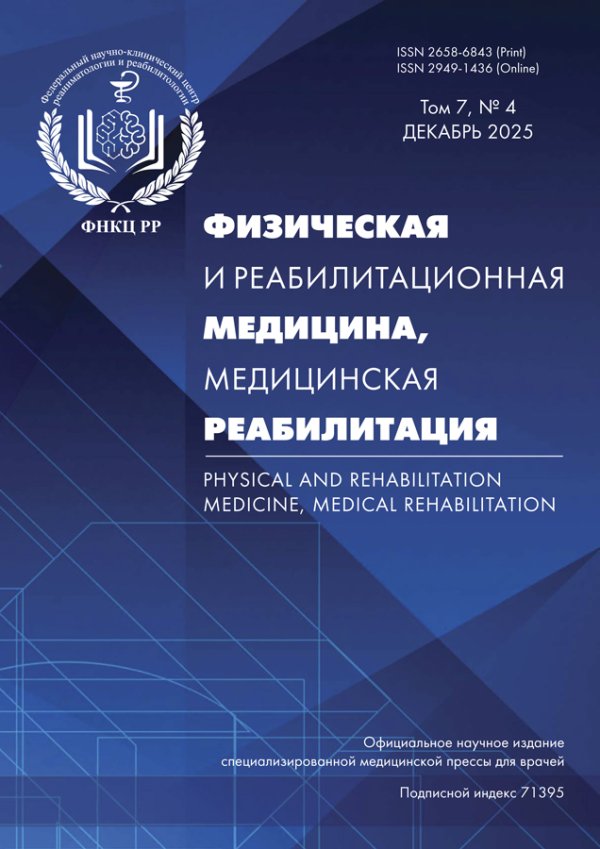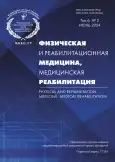The influence of patient motivation on the motor function restoration during stroke recovery. Preliminary results of a clinical study
- Authors: Melnikova E.A.1, Tkachenko G.A.2,3, Tsvetkova E.M.1,2, Starkova E.Y.1, Vladimirova N.N.2, Litau V.Y.1
-
Affiliations:
- Moscow Regional Research and Clinical Institute
- Central Clinical Hospital of the Management Affair of President Russian Federation
- Central State Medical Academy of Department of Presidential Affairs
- Issue: Vol 6, No 2 (2024)
- Pages: 122-130
- Section: ORIGINAL STUDY ARTICLE
- URL: https://bakhtiniada.ru/2658-6843/article/view/259226
- DOI: https://doi.org/10.36425/rehab629104
- ID: 259226
Cite item
Full Text
Abstract
BACKGROUND: Acute cerebrovascular accidents lead to disability. The most important task is the rehabilitation and adaptation of these patients to society. Impaired motivation reduces the effectiveness of rehabilitation measures. AIMS: To assess the motivation of patients during stroke recovery; identify relationships between the level of motivation, duration and type of stroke, and cognitive and demographic indicators; and determine the influence of the patient’s initial level of motivation on the effectiveness of the rehabilitation. MATERIALS AND METHODS: This prospective study analyzed 36 patients with hemiparesis in the early and late recovery period of stroke. All patients were assessed according to the international classification of functioning, disability, and health; functional independence scale; Rivermead mobility index; degree of paresis according to the Medical Research Committee scale; level of spasticity according to the Ashford scale; risk of falls assessment according to the Morse scale; assessment of function of the upper and lower extremities using the Fugl–Meyer test; and balance assessment using the Berg scale. RESULTS: A significant positive correlation was found between the patient’s motivation and cognitive indicators: the integral level of the BTLD (r=0.653; p=0) and the integral indicator of the Mini-Mental State Examination (r=0.536; p=0.001). No convincing evidence supports the connection between the motivation level and indicators as such sex, age, body mass index, time since stroke, stroke type and location, pain level, functional independence level, and motor impairment. Although a trend toward greater positive changes in functional recovery of the arm, leg, balance, and overall independence was observed, no significant difference was found between groups. CONCLUSION: A significant relationship was found between motivation and cognitive functions, which can serve as predictors of the motivation level of patients when planning rehabilitation activities. A trend toward positive changes in functional recovery of the arm, leg, balance, and overall independence was found in patients with high motivation levels.
Keywords
Full Text
##article.viewOnOriginalSite##About the authors
E. A. Melnikova
Moscow Regional Research and Clinical Institute
Email: melkaterina3@yandex.ru
ORCID iD: 0000-0002-7498-1871
SPIN-code: 8558-0908
Scopus Author ID: 57175401900
MD, Dr. Sci. (Med.), Professor
Russian Federation, MoscowG. A. Tkachenko
Central Clinical Hospital of the Management Affair of President Russian Federation; Central State Medical Academy of Department of Presidential Affairs
Email: mitg71@mail.ru
ORCID iD: 0000-0002-5793-7529
SPIN-code: 1790-3626
Cand. Sci. (Psychology)
Russian Federation, 15 Marshala Timoshenko street, 121356 Moscow; MoscowE. M. Tsvetkova
Moscow Regional Research and Clinical Institute; Central Clinical Hospital of the Management Affair of President Russian Federation
Email: EMTSvetkova@cchp.ru
ORCID iD: 0009-0000-1761-4859
SPIN-code: 6093-5064
Russian Federation, Moscow; Moscow
E. Yu. Starkova
Moscow Regional Research and Clinical Institute
Email: elena.starkova@inbox.ru
ORCID iD: 0000-0001-9371-5934
SPIN-code: 5334-7258
Russian Federation, Moscow
N. N. Vladimirova
Central Clinical Hospital of the Management Affair of President Russian Federation
Email: nadezhda.vladimirova@gmail.com
ORCID iD: 0000-0002-8929-3748
Cand. Sci. (Med.)
Russian Federation, MoscowV. Yu. Litau
Moscow Regional Research and Clinical Institute
Author for correspondence.
Email: lotisen741@gmail.com
ORCID iD: 0009-0003-6255-405X
Russian Federation, Moscow
References
- Alferova VV, Belkin AA, Voznyuk IA, et al. Clinical recommendations for the management of patients with ischemic stroke and transient ischemic attacks. Ed. by L.V. Stakhovskaya. Moscow: Biblioteka prakticheskogo vracha; 2017. 196 р. (In Russ).
- Nuvakhova MB. Rehabilitation of patients with cognitive impairment after stroke during the late recovery period. S.S. Korsakov J Neurol Psychiatry. 2021;121(8-2):76–85. EDN: VXCXZA doi: 10.17116/jnevro202112108276
- Kayerova EV, Zhuravskaya NS, Kozina EA, Shakirova OV. Restoration of upper limb motor function after stroke. Bull Rehab Med. 2021;20(1):21–26. EDN: XZVGJU doi: 10.38025/2078-1962-2021-20-1-21-26
- Feigin VL, Norrving B, Mensah GA. Global burden of stroke. Circulation Res. 2017;120(3):439–448. doi: 10.1161/CIRCRESAHA.116.308413
- Kim AS, Cahill E, Cheng NT. Global stroke belt: Geographic variation in stroke burden worldwide. Stroke. 2015;46(12): 3564–3570. EDN: VELBDT doi: 10.1161/STROKEAHA.115.008226
- Sergeeva SP, Savin AA, Litvitsky PF. A role of the fas system in the pathogenesis of ischemic stroke. S.S. Korsakov J Neurol Psychiatry. 2016;116(3-2):3–8. EDN: WAKNEF doi: 10.17116/jnevro2016116323-8
- Belyaeva IA, Martynov MYu, Gusev EI. Fundamentals of modern neurorehabilitation. In: Brain diseases: From the study of mechanisms to diagnosis and treatment. National leadership. Ed. by E.I. Guseva, A.N. Konovalova, V.I. Skvortsova, A.B. Geht. Moscow: GEOTAR-Media; 2018. Vol. 1. Р. 821–824. (In Russ).
- Verbitskaya SV, Parfenov VA, Reshetnikov VA, et al. Post-stroke cognitive impairment (results of a 5-year follow-up). Neurology Neuropsychiatry Psychosomatics. 2018;10(1):37–42. EDN: URIJOY doi: 10.14412/2074-2711-2018-1-37-42
- Emelin AYu, Lobzin VYu, Vorobyov SV. Cognitive impairment: A guide for physicians. Moscow; 2019. 414 р. (In Russ).
- Jokinen H, Melkas S, Ylikoski R, et al. Post-stroke cognitive impairment is common even after successful clinical recovery. Eur J Neurol. 2015;22(9):1288–1294. doi: 10.1111/ene.12743
- Bogolepova AN, Levin OS. Cognitive rehabilitation of patients with focal brain damage. S.S. Korsakov J Neurol Psychiatry. 2020;120(4): 115–122. EDN: HYTCEA doi: 10.17116/jnevro2020120041115
- Zakharov VV, Vakhnina NV. Practical algorithms for managing patients with cognitive impairments. Medical Council. 2019;(6):27–33. EDN: MIFRAN doi: 10.21518/2079-701X-2019-6-27-33
- Shabanova AS. Motivation to treatment in patients with different somatic diseases. Bulletin Physiol Pathol Respirat. 2015;(57): 130–136. EDN: UHGLDH
- Maggio MG, Latella D, Maresca G, et al. Virtual reality and cognitive rehabilitation in people with stroke: An overview. J Neurosci Nurs. 2019;51:101–105. doi: 10.1097/JNN.0000000000000423
- Yoshida T, Otaka Y, Kitamura S, et al. Influence of motivation on rehabilitation outcomes after subacute stroke in convalescent rehabilitation wards. Front Neurol. 2023;(14):1185813. EDN: SSOBWW doi: 10.3389/fneur.2023.1185813
- Svetkina AA. Psychological rehabilitation of patients with stroke. Med Psihol Ross. 2016;8(5):7. EDN: XZCRKX doi: 10.24411/2219-8245-2016-15070
- Belova NA. Scales, tests and questionnaires in medical rehabilitation. Moscow: Meditsina; 2002. 440 p. (In Russ).
- Dubois B, Slachevsky A, Litvan I, Pillon B. The FAB: A Frontal Assessment Battery at bedside. Neurology. 2000;55(11):1621–1626. doi: 10.1212/wnl.55.11.1621
- Zigmond AS, Snaith RР. The Hospital anxiety and depression scale. Acta Psychiatr Scand. 1983;67(6):361–370. doi: 10.1111/j.1600-0447.1983.tb09716.x
- Hallams S, Baker K. The development of a questionnaire to assess motivation in stroke survivors: A pilot study. New Zealand J Psychotherapy. 2009;(37):55–60.
- Maclean N, Pound P, Wolfe C, Rudd A. The concept of patient motivation: A qualitative analysis of stroke professionals’ attitudes. Stroke. 2002;33(2):444–448. doi: 10.1161/hs0202.102367
- Pan L, Song A, Wang S, Duan S. Experimental study on upper-limb rehabilitation training of stroke patients based on adaptive task level: A preliminary study. Biomed Res Int. 2019;2019:2742595. doi: 10.1155/2019/2742595
- Lin FH, Yih DN, Shih FM, Chu CM. Effect of social support and health education on depression scale scores of chronic stroke patients. Medicine (Baltimore). 2019;98(44):e17667. doi: 10.1097/MD.0000000000017667
- Oyake K, Suzuki M, Otaka Y, Tanaka S. Motivational strategies for stroke rehabilitation: A descriptive cross-sectional study. Front Neurol. 2020;11:553. doi: 10.3389/fneur.2020.00553
- Zhang Q, Schwade M, Smith Y, et al. Exercise-based interventions for post-stroke social participation: A systematic review and network meta-analysis. Int J Nurs Stud. 2020;(111):103738. doi: 10.1016/j.ijnurstu.2020.103738
- Zulkifly MF Mohd, Ghazali SE, Che Din N, et al. The ability of recovery locus of control scale (RLOC) and post-traumatic stress symptoms (PTSS) to predict the physical functioning of stroke patients. Malaysian J Med Sci. 2015;22(5):31–41.
- Kotelnikova AV, Kukshina AA, Tihonova AS, Tkachenko GA. Adherence to treatment as a predictor of the effectiveness of including vr and ar technologies in the psychological support of patients with movement disorders in medical rehabilitation. Kremlin Medicine. Clinical Bulletin. 2020;(3):72–81. EDN: ZSFIDN doi: 10.26269/72cj-dh29
- Tan M, Li H, Wang X. Analysis of the current status of rehabilitation motivation and its influencing factors in older adults with stroke: A cross-sectional study. Front Aging Neurosci. 2023;15:1186681. EDN: QNJHQT doi: 10.3389/fnagi.2023.1186681
- Rapoliene J, Endzelyte E, Jaseviciene I, Savickas R. Stroke patiens motivation influence on the effectiveness of occupational therapy. Rehabil Res Pract. 2018;2018:9367942. doi: 10.1155/2018/9367942
- Spence JD, Barnett JM. Stroke prevention, treatment and rehabilitation. McGraw Hill Professional; 2012. 306 р.
- Kobylańska M, Kowalska J, Neustein J, et al. The role of biopsychosocial factors in the rehabilitation process of individuals with a stroke. Work. 2018;61(4):523–535. doi: 10.3233/WOR-162823
- Ytterberg C, Kristensen HK, Tistad M, von Koch L. Factors related to met needs for rehabilitation 6 years after stroke. PLoS One. 2020;15(1):e022786722. doi: 10.1371/journal.pone.0227867
Supplementary files








